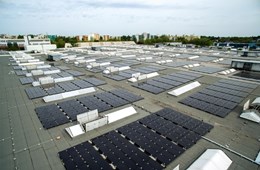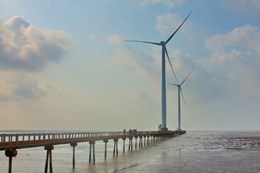-

GE is putting a new, highly efficient hybrid power plant into operation in Berlin. With this pioneering concept, which offers scalable capacity, GE and its project partners Kofler Energies and BELECTRIC are breaking new ground in the area of innovative, decentralized energy supply.
-

On May 18, the workshop to "Review the Vietnam Energy Efficiency Standard and Labeling Program" was held. The project has been implemented by the Ministry of Industry and Trade since 2012 with funding from the Australian Government.
-

Bac Lieu province with its 56km coastline is considered the best place of wind speeds in the country (averaged from 6.5 to 7.2 m/s, up to 10m/s in the peak month), with many main wind directions. Furthermore, along the coastal area of Bac Lieu there are uninhabited mudflats, very favorable for wind power development.
-

Currently, the energy consumption of households in Huong Hoa accounts for 50% of total electricity consumption in the district. Therefore, helping people to raise awareness of saving electricity, especially in the difficult areas is the main thrust of the district electricity board.
-

The Middle East can take a giant step towards energy efficiency by switching to air conditioning systems with compressor modulation, reducing energy consumption by up to 40 per cent, according to experts.
-

A report delivered by Finance Minister Yiannis Varoufakis on the Greek economy’s prospects and possible revisions in various sectors has stressed the importance of energy efficiency.
-

The first near zero-energy hall in Finland for commercial and office premises has been completed at Häme University of Applied Sciences (HAMK) in Hämeenlinna.
-

When we think of renewable energy and energy efficiency, large-scale projects often come to mind.
-

On May 14, 2015, a workshop on clean energy took place in HCM City with the theme "Smart Solutions for Vietnam". The Workshop was co-organized by the US Consulate General in Ho Chi Minh City and Investment Newspaper to promote clean energy cooperation between the two countries.
-

NASA was conducting the Leading Edge Asynchronous Propeller Technology (LEAPTech) project — an initiative which may herald in a new age of aviation where aircraft are powered through electric motors.
-

The automotive industry dreams of the utopian “green factory”, with lower energy consumption and subsequently reduced energy costs.
-

Ha Giang Provincial People's Committee issued a Plan for energy saving and efficiency in the province for the period of 2013 - 2015. The plan states that in 2015, the province is to achieve a total savings of 6% of the province's electricity consumption as in the forecast on electricity demand, reflected in Master Plan for Power Development of Ha Giang in the phase 2011 - 2015.
-

New cars (7 seats or fewer) must have energy label from January 1st, 2015 under Inter-ministerial Joint Circular No. 43/2014/TTLT BGTVT-BCT promulgated by the Ministry of Transport and Ministry of Industry and Trade on energy labeling for motor vehicles.
-

Following the success of 6 annually organized exhibitions, the 7th international exhibition of Energy Efficiency - Hanoi Environment (Entech HANOI 2015), will officially take place from on May 20 -22, 2015 at the Expo Center International ICE Hanoi, 91 Tran Hung Dao, Hanoi.
-

Faced with climate change causing serious consequences, energy saving has become more urgent than ever. In Da Lat city (Lam Dong province), energy saving has become a mass movement, not only popular in the manufacturing enterprises and households but also spreading to all the public offices.
-

Window shopping through some electric and electronics stores in Hanoi, although it is early summer, the atmosphere for shopping electric appliances could be felt, with upcoming hot days in forecast. This year, besides the price criteria, the electricity price increase highlights the energy-saving criterion, taking a lot of consumers' concern. The concern is to do not only with high capacity products but also with daily essential appliances like lamps and electric kettles.
-

The Environmental Protection Agency's (EPA) new mercury pollution regulations that took effect last month opened the flood gates for a new multi-billion-dollar energy industry that has investors scrambling to get in on second-generation technology poised for massive revenue gains.
-

5 cctions that can improve the energy efficiency of existing haul truck fleets in mining
-

The transformation from a traditional kiln to tunnel kiln is considered to be the direction to solve problems for the brick kiln owners in Vinh Long on fuel costs, energy savings, and production efficiency.
-

Only a few days earlier the World Energy Council’s Iranian national member committee had partnered with the Iranian Government for another efficiency dedicated event: the 7th International Renewable Energy, Energy Efficiency and Energy Saving Exhibition in Tehran.



















